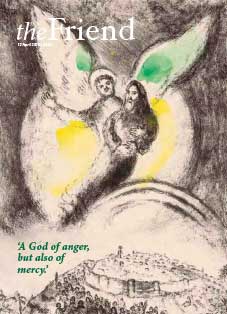
The Friend is a weekly magazine in which Friends speak to each other and to the wider world, offering their insight, ideas, news, nurture and inspiration.
Nurturing Quaker community, each issue offers a space for Friends to share their concerns, and to support each other in faith and witness.
The Friend: enriching, inspiring and connecting the Quaker community since 1843.
Last week I had my eighty-seventh birthday. In three short years, I’ll be ninety. Why am I not a grumpy old man? There’s a host of things I can no longer do, so why hasn’t frustration built up? Well, one major blessing is Quakerism. Looking back over the years, it has played a key role – not something I necessarily conceded at the time.
One of the things we may have learned at school and Sunday school is that the God of the Old Testament was a God of anger, while the God of the New Testament is a God of love. But is that fair? Who is the God of the Old Testament? (I prefer to speak of it as the Hebrew Bible, since ‘Old Testament’ may imply that Christianity has superseded Judaism.)
Bristol Quakers have been putting the issue of reparations under the spotlight. More than eighty people joined a two-part reparations workshop at Redland Meeting House on 24 February and 23 March.
In his recent letter to this magazine (29 March) Gerard Bane asked some questions that matter to me. ‘Why are Quakers in decline?’, he writes. ‘Is it their aging population?… Are apparent outsiders put off by Quaker activism?… Are people put off because of Quaker beliefs? Or are people put off by the apparent lack of beliefs?’
We gathered at Launde Abbey to explore the elements that make for successful rehabilitation. Daily prison populations are expected to increase to between 94,000 and 114,000 by 2027. How can rehabilitation be delivered in these circumstances? We heard of some glimmers of light. The 12 Step Programme, developed by Alcoholics Anonymous, is one. It is effective for other addictions, with built in support, affirmation and positivity, all of which address the key issue of low self-esteem. Another advantage is that group members can continue the same practice in the community.

Become a subscriber to enjoy unlimited access to our articles, dating back to 2009! Online subscribers get the Friend to their inbox each week, can comment on articles, and dive into our 1914-18 digital archive too!
Whether you are new to Quakerism or have been going to Meeting for years, you’ll find something here to inspire, inform and challenge you.
News | Views | Reviews
Written by and for Friends on the bench
Subscribe